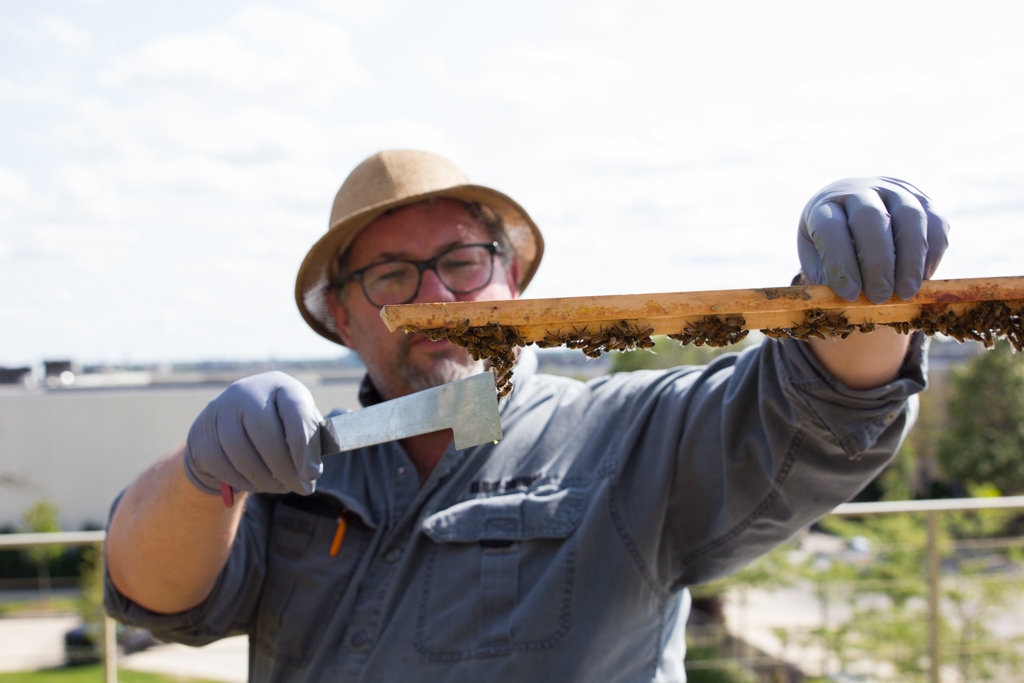Apple orchards, pumpkin patches and corn mazes are all fall classics, but imagine a world without them, or without 60-80 percent of the fruits and vegetables you enjoy all year. This fruitless future may not be too far out of reach. With a rapidly declining honey bee population, our food supply has become increasingly at risk. Fortunately, companies like Beepods are trying to create change.
Beepods, a local Milwaukee company, was founded by Charlie “Charbee” Koenen, long time beekeeper and design expert. Beepods is devoted to the idea of small organic beekeeping to help declining bee populations and spread awareness through education.
“It’s just being more aware of your environment and giving back however you can,” Brad James, CEO of Beepods said. “Some people might choose to buy more expensive non-GMO or organic vegetables. This is the way I give back.”
The beepods themselves provide an innovative organic top bar hive system that inspired traditional ancient beekeepers. They allow for bees to build hives similarly to how they would in nature, are user friendly and come with plenty of educational resources about beekeeping. Beepods can be found on rooftops all over the Milwaukee area and provide a unique and direct educational experience for households, businesses and schools.
Often when we think of a bee, we think of a pesky creature with a stinger that could hurt us. In reality, bees are essential to human life and survival. Bees pollinate around one-third of our food supply, making them the single most important species for the pollination of fruits and vegetables. They are also one of the most at-risk species.
Many hives face Colony Collapse Disorder (CCD) an event in which a colony of worker bees inexplicably disappears from their hives.
While CCD can be directly observed, there is no clear answer as to why it causes the loss of one-third of the honey bee population each year. There seems to be a multitude of complex problems that could play a roll in declining populations. For one, beekeeping has become industrialized. Another is the increase in neonicotinoids, or what James calls, nicotine for bees.
Climate change, habitat loss and general misconduct of the environment could also be causing the suffering of the bee populations.
“People are also afraid of bees,” James said. “What they really mean are wasps and hornets, other more aggressive species. Honey bees are naturally pretty docile.”
Like many important issues, there is not just one problem, and there will not be just one solution. However, when it comes to helping bees, James said a shift in culture can help.
Beepods provides many opportunities for customers and the community to learn more about bees. “Pollen Pass: Meet the Bees” is an open apiary hosted by Beepods that takes place every Thursday from 5-6 p.m. and Sunday from 3-4 p.m. Admission is free, and the family-friendly event allows guests to learn about beekeeping alongside Koenen, Beepods founder. “Pollen Pass” is just one of the many ways Beepods is trying to grow an educated community of beekeepers. More information is available on Beepods’s Facebook page.
Restoration of lost bee populations cannot happen overnight, but spreading awareness can. Consciously thinking about the one out of every three bites of food that comes from the work of bees, becoming actively involved with environmental groups or services, or even just stopping a friend from squashing a harmless pollinator are all ways to make a difference.




Asil Flow • Oct 8, 2015 at 5:58 pm
Thanks for the awareness. Where are these “Meet the Bee’s” open apiaries located?